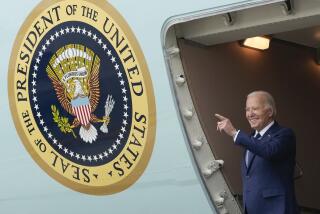Don’t Hold a Place on Mt. Rushmore
- Share via
“Compassionate conservatism” or “practical idealism”--choose your non-poison, in English or in Spanish. Two center-conscious politicians, George W. Bush and Al Gore, seem determined to overlap each other’s idiom, as well as ideology.
Bush said on Monday that he was against abortion “litmus tests” for judges, putting one more nail in the coffin of the Republican right-to-life movement. Meanwhile, Gore, who previously embraced a “faith-based” social work that is anathema to the Democratic left, went on to say that President Clinton’s sexual misconduct was “inexcusable,” further “stolidifying” his middle-of-the-roadism. And in his announcement speech in Tennessee, in yet another distancing dig at Clinton, Gore pledged to put “family life at the top of our hierarchy of values, where it belongs.”
Why is it that the American political system, queries British political scientist James Bryce, has produced so few distinguished--or even distinguishable--presidents? In his book, “The American Commonwealth,” he offers three reasons for the greatness deficit. First, the greatest people don’t enter politics in the first place; second, the presidential selection process tends to weed greatness out, looking instead for more mundane virtues, such as the ability to win; third, uneventful times naturally produce unexceptional politics, and America, in a comparative sense, has had an uneventful history. Surveying the presidential crop, Bryce adds, “The only remarkable thing about them is that being so commonplace, they climbed so high.”
So what would Bryce think of Gore and Bush, two heirs to famous political names who have neared the pinnacle of their respective parties without having had one great moment or phrase or idea between them? Would either man be so prominent if their names were simply Albert Arnold and George Walker? Bryce is unavailable for comment--because he died in 1922. But parts of “The American Commonwealth” read as if they were written yesterday, and for good reason: The sturdy continuity of American democracy provides the same bias toward bland mediocrity that was so evident to Bryce in 1888.
But one who is available for copious comment is Dick Morris, the onetime advisor to everyone from President Clinton to Senate Majority Leader Trent Lott (R-Miss.). Morris has just published a book, “The New Prince,” intended, he writes, “to identify what the modern pragmatist must do to win.” One can imagine the electoral antennae of both Gore and Bush perking up.
Old issues, such as the Cold War and the deficit, Morris argues, are “winding down”; peace and prosperity are transforming the agenda of both parties, “from guaranteeing economic minimums to catalyzing lifestyle improvement.” Morris rattles off policy ideas that fit the post-ideological future he foresees, some of which are more difficult for Republicans--stricter gun control--while others are more problematic for Democrats--stricter educational standards--but none of which seem destined to provoke grand greatness-producing passions.
To be sure, “politics” will still exist, as in the Democratic campaign to oust Newt Gingrich, for example, and the Republican campaign to oust Clinton. But Morris is right when he suggests that such ferocious feuding merely masks the “consensus” that has formed around the ideas and issues of the status quo.
But his most compelling point is that the political system itself has decisively changed, in a way that would underscore Bryce’s low opinion of American pols. Constant news reporting and instant polling have transformed politics, Morris writes, from a remote Madisonian system, “where voters cede their power every two years to their elected representatives,” to a real-time Jeffersonian system, “where direct citizen involvement and interest is almost constant.” As a result, future presidents will not be able to take great risks, because in the faster feedback future, a president with a popularity rating below 50% is, Morris argues, “functionally out of office.”
If Morris is right, if politicians grow even more dependent on their consultant consigliere, then Mt. Rushmore-status will prove even more elusive. While Bryce, European that he was, lamented the lack of majesty in American politics, he conceded that greats “are not, in quiet times, absolutely needed.” Which, of course, is the real greatness of America:
in all but the most extraordinary times, politics doesn’t matter much, and so ordinary politicians are all we need.
More to Read
Get the L.A. Times Politics newsletter
Deeply reported insights into legislation, politics and policy from Sacramento, Washington and beyond. In your inbox twice per week.
You may occasionally receive promotional content from the Los Angeles Times.










